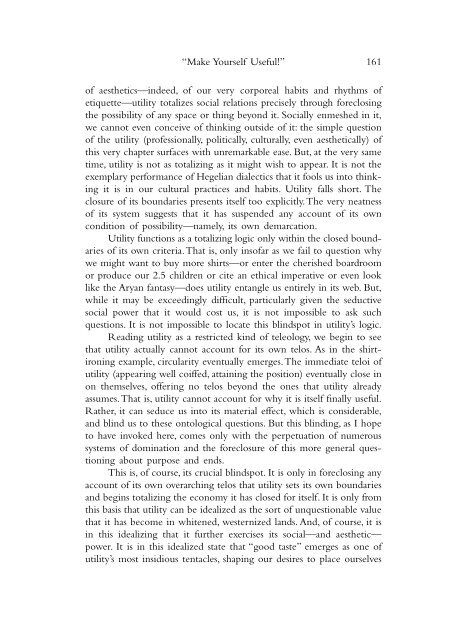Create successful ePaper yourself
Turn your PDF publications into a flip-book with our unique Google optimized e-Paper software.
“Make Yourself Useful!”<br />
161<br />
<strong>of</strong> aes<strong>the</strong>tics—indeed, <strong>of</strong> our very corporeal habits and rhythms <strong>of</strong><br />
etiquette—utility totalizes social relations precisely through foreclosing<br />
<strong>the</strong> possibility <strong>of</strong> any space or thing beyond it. Socially enmeshed in it,<br />
we cannot even conceive <strong>of</strong> thinking outside <strong>of</strong> it: <strong>the</strong> simple question<br />
<strong>of</strong> <strong>the</strong> utility (pr<strong>of</strong>essionally, politically, culturally, even aes<strong>the</strong>tically) <strong>of</strong><br />
this very chapter surfaces with unremarkable ease. But, at <strong>the</strong> very same<br />
time, utility is not as totalizing as it might wish to appear. It is not <strong>the</strong><br />
exemplary performance <strong>of</strong> Hegelian dialectics that it fools us into thinking<br />
it is in our cultural practices and habits. Utility falls short. The<br />
closure <strong>of</strong> its boundaries presents itself too explicitly. The very neatness<br />
<strong>of</strong> its system suggests that it has suspended any account <strong>of</strong> its own<br />
condition <strong>of</strong> possibility—namely, its own demarcation.<br />
Utility functions as a totalizing logic only within <strong>the</strong> closed boundaries<br />
<strong>of</strong> its own criteria. That is, only ins<strong>of</strong>ar as we fail to question why<br />
we might want to buy more shirts—or enter <strong>the</strong> cherished boardroom<br />
or produce our 2.5 children or cite an ethical imperative or even look<br />
like <strong>the</strong> Aryan fantasy—does utility entangle us entirely in its web. But,<br />
while it may be exceedingly difficult, particularly given <strong>the</strong> seductive<br />
social power that it would cost us, it is not impossible to ask such<br />
questions. It is not impossible to locate this blindspot in utility’s logic.<br />
Reading utility as a restricted kind <strong>of</strong> teleology, we begin to see<br />
that utility actually cannot account for its own telos. As in <strong>the</strong> shirtironing<br />
example, circularity eventually emerges. The immediate teloi <strong>of</strong><br />
utility (appearing well coiffed, attaining <strong>the</strong> position) eventually close in<br />
on <strong>the</strong>mselves, <strong>of</strong>fering no telos beyond <strong>the</strong> ones that utility already<br />
assumes. That is, utility cannot account for why it is itself finally useful.<br />
Ra<strong>the</strong>r, it can seduce us into its material effect, which is considerable,<br />
and blind us to <strong>the</strong>se ontological questions. But this blinding, as I hope<br />
to have invoked here, comes only with <strong>the</strong> perpetuation <strong>of</strong> numerous<br />
systems <strong>of</strong> domination and <strong>the</strong> foreclosure <strong>of</strong> this more general questioning<br />
about purpose and ends.<br />
This is, <strong>of</strong> course, its crucial blindspot. It is only in foreclosing any<br />
account <strong>of</strong> its own overarching telos that utility sets its own boundaries<br />
and begins totalizing <strong>the</strong> economy it has closed for itself. It is only from<br />
this basis that utility can be idealized as <strong>the</strong> sort <strong>of</strong> unquestionable value<br />
that it has become in whitened, westernized lands. And, <strong>of</strong> course, it is<br />
in this idealizing that it fur<strong>the</strong>r exercises its social—and aes<strong>the</strong>tic—<br />
power. It is in this idealized state that “good taste” emerges as one <strong>of</strong><br />
utility’s most insidious tentacles, shaping our desires to place ourselves
















